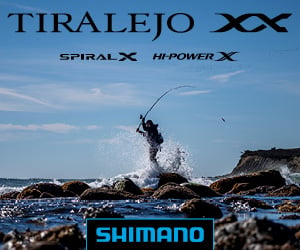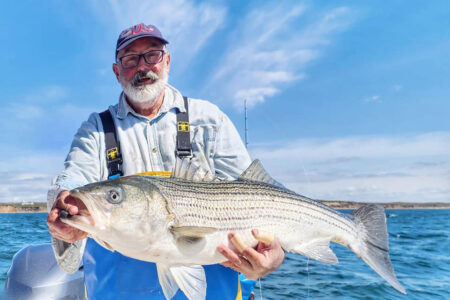Once again the targeting of striped bass in the Exclusive Economic Zone (EEZ) around Block Island is in the news, an action that has been on the agenda of many for quite some time.
In 2017 Rep. Lee M. Zeldin (R. New York), sponsored H.R. 1195 – Local Fishing Access Act which, if passed, would authorize the National Oceanic and Atmospheric Administration (NOAA) to permit and regulate Atlantic striped bass fishing in the Block Island Sound Transit Zone. The transit zone is the area of federal waters within Block Island Sound, located between areas south of Montauk Point, New York, and Point Judith, Rhode Island. Well, Rep. Zeldin is at it again, and for now it appears as if he may have succeeded in his end goal of allowing anglers to target and harvest striped bass in Federal waters in a roundabout, underhanded way, as you will see.
On Friday, February 23, 2018, an email began circulating that originated from Mark Alexander, the Assistant Director of the Fisheries Division in Connecticut. In Mark’s email he mentioned an item in the Atlantic States Marine Fisheries (ASMFC) legislative tracking sheet that touched upon a potentially catastrophic item in the 2018 budget. As he noted, “…the Fiscal Year 2018 omnibus appropriations bill approved by the House prohibits NOAA Fisheries and the Coast Guard from enforcing the current moratorium on striped bass harvest in the EEZ surrounding Block Island, RI.” This is like having a speed limit posted on the highway running through your town, but the mayor forbidding its police force from enforcing it. If you think that everyone is going to voluntarily limit their speed just because they are supposed to, then you are grossly overestimating your fellow man. And the same type of thing is going to happen with striped bass in the waters that surround Block Island.
Upon further investigation, it was confirmed that the amendment that included this reference was, in fact, sponsored by Rep. Zeldin. According to the ASMFC’s legislative tracking sheet, “Additionally, the House approved an omnibus appropriations bill, which combined all 12 House appropriations bills, on September 14, 2017. During consideration of the bill, Rep Lee Zeldin (R-NY) offered two successful amendments that prohibit the Coast Guard and NOAA Fisheries from enforcing a moratorium on striped bass harvest in the EEZ surrounding Block Island, Rhode Island.”
It is already well known that at times just as many if not more boats fish illegally for striped bass in the Federal waters surrounding Block Island as do so legally inside the 3-mile line. Boats are regularly caught fishing outside the 3-mile limit, and some captains do so knowing full-well of the repercussions of their actions and consider the chance of being caught as little more than a “cost of doing business.” This action of eliminating enforcement is, in essence, going to do little more than remove the need for those captains to look over their shoulder as they continue to fish illegally as it does not “legalize” their actions.
If you are not familiar with it, the Exclusive Economic Zone (EEZ) extends from the shoreline out to 200 nautical miles in which the country owning the shoreline has the exclusive right to conduct certain activities such as fishing. In the United States, the EEZ is split into state waters (typically from the shoreline out to 3 nautical miles) and federal waters (typically from 3 to 200 nautical miles.) Often the acronym “EEZ” refers specifically to federal waters. Fishing for striped bass is prohibited in the EEZ with the Atlantic Striped Bass Conservation Act — P.L. 98-613, which was approved October 31, 1984, and which recognized the commercial and recreational importance, as well as the interjurisdictional nature, of striped bass, and established a unique State-based, Federally backed management scheme.
Sec. 5158. – Protection of striped bass in the exclusive economic zone
(a) Regulation of fishing in exclusive economic zone
The Secretary shall promulgate regulations governing fishing for Atlantic striped bass in the exclusive economic zone that the Secretary determines –
- are consistent with the national standards set forth in section 301 of the Magnuson Act (16 U.S.C. 1851);
- are compatible with the Plan and each Federal moratorium in effect on fishing for Atlantic striped bass within the coastal waters of a coastal State;
- ensure the effectiveness of State regulations on fishing for Atlantic striped bass within the coastal waters of a coastal State; and
- are sufficient to assure the long-term conservation of Atlantic striped bass populations.
So what now? Where do we go from here? First off, simply eliminating the ability to enforce a Federal law will not immediately signal the end of striped bass as we know them. I can only speculate, but if this action remains in place once striped bass return to our waters later this spring, then it only seems logical that more boats will head out to the EEZ in search of striped bass. Whether founded or not, the existence of so-called “super schools” of massive striped bass inhabiting Federal waters was enough to draw anglers away in the past even with the fear of prosecution looming over their heads, but now knowing that there is almost zero likelihood of prosecution for breaking the law will most certainly attract more anglers. But this is not likely to be the final straw that breaks the camel’s back, as they say. It does, however, open up Pandora’s Box and sets an extremely bad precedent going forward in fisheries management as interest groups find new and original means to their ends. I can only imagine what will come next.
But, that all said, the fact is that things can still change. There is still plenty of time to fix this error on the part of the Federal government and right their wrong. Now is the time to act and voice your opposition. Call and write your state and federal representatives. Get word to your state’s fisheries management division. Tell anyone willing to listen that you oppose this green light to break the law. If we can make enough noise on the subject then maybe, just maybe we can right this wrong before too much damage is done.



